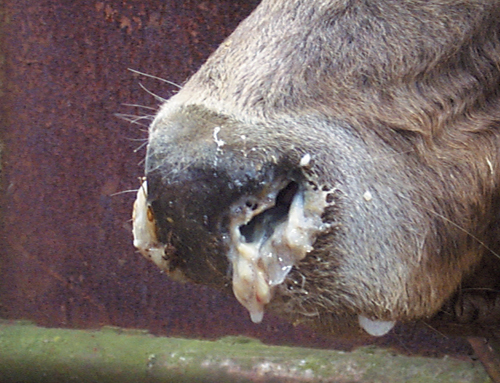Difference between revisions of "Cattle Medicine Q&A 05"
| Line 33: | Line 33: | ||
| align="center" | [[File:Wikivet logo.png|40px|WikiVetlogo]] | | align="center" | [[File:Wikivet logo.png|40px|WikiVetlogo]] | ||
| align="left" | <p>Comments by Nick Lyons MA VetMB CertCHP MRCVS</p> | | align="left" | <p>Comments by Nick Lyons MA VetMB CertCHP MRCVS</p> | ||
| − | <p>1. It is unlikely that vaccination confers lifelong protection. According to NOAH compendium, Rispoval IBR Marker live vaccine marketed in the UK, in all cases protection lasts for 6 months. | + | <p>1. It is unlikely that vaccination confers lifelong protection. According to NOAH compendium, Rispoval IBR Marker live vaccine marketed in the UK, in all cases protection lasts for 6 months. It is likely this is the case for all other IBR vaccine products.</p> |
|} | |} | ||
<br><br><br> | <br><br><br> | ||
Revision as of 15:00, 19 March 2012
| This question was provided by Manson Publishing as part of the OVAL Project. See more Cattle questions |
In mid-autumn you attend a group of 64 housed beef cattle aged 9–12 months, purchased from numerous markets over the previous 3 weeks. Frequent coughing has been heard in the group over the past week. The farmer has selected two inappetant animals with purulent ocular and nasal discharges for veterinary examination. Clinical examination reveals pyrexia (40.8 and 41.1°C (105.4 and 106.0°F) respectively). The respiratory rate is increased and auscultation of the chest reveals crackles but these sounds are transferred from the upper respiratory tract. Visual inspection of the remainder of the group reveals a number of cattle with mucopurulent ocular and nasal discharges and tachypnoea. Six animals are selected and examined, all of which have a rectal temperature >40.5°C (104.9°F).
| Question | Answer | Article | |
| What conditions would you consider? (Most likely first.) | The most likely conditions to consider include: IBR; pasteurellosis; blue-tongue; BRSV infection. |
Link to Article | |
| How could you confirm your diagnosis? | Many animals in the group are febrile suggesting a viral aetiology. Ocular swabs (vigorous action to obtain cellular material) for FAT for IBR are taken from four to six febrile cattle with a serous discharge. If the swabs cannot be delivered to the laboratory that day, they should be smeared on to glass slides and air-dried. Results of FAT should be available within hours. Paired serology would involve 2 weeks’ delay. |
Link to Article | |
| What treatment(s) would you recommend? | The farmer is advised to vaccinate all cattle immediately with an intranasal IBR vaccine. All sick cattle are treated with an intramuscular injection of procaine penicillin at 44,000 IU/kg for 3 consecutive days and then re-examined. No clinical advantage is gained by using one of the much more expensive antibiotics such as florfenicol or tulathromycin. |
Link to Article | |
| What control measures could be adopted for future years? | Vaccination against IBR upon arrival on the farm is very effective and affords life-long protection1. Animals should be quarantined for at least 2 weeks after arrival on the farm. |
Link to Article | |
